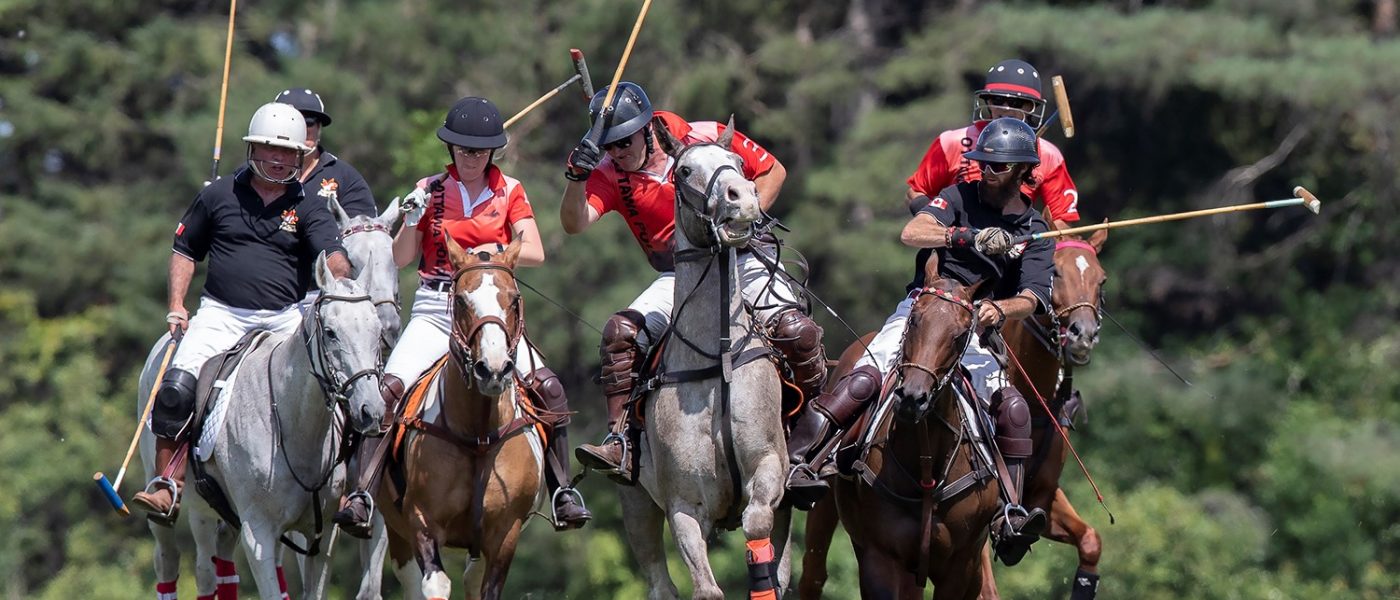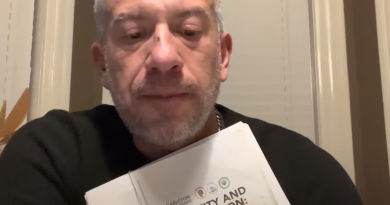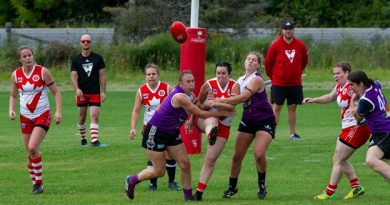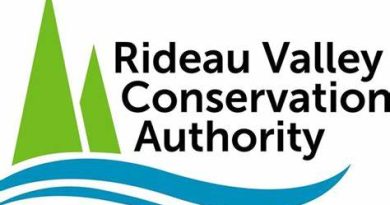Polo celebrates its 35th Year in South Carleton
By Jeff Morris
It’s not often that a sport being played in a field beside a country road draws rubberneckers and entices people to stop their cars and watch, and even go and ask questions.
But when the Ottawa Polo Club hosts their matches at their home field on Bankfield Road near Highway 416 west of Manotick, that’s exactly what happens.
People pause when they see it, but it is not something they expect to see played locally. Polo seems to only get exposure on news channel clips featuring members of the Royal Family, or in movies where socialites with names like Biff, Chip and Muffy are seen playing or cheering on their friends. The sport is a tool in these scenes to exemplify how overprivileged and aristocratic the characters are.
Locally, that stereotype of polo is nothing like its reality. Despite the image polo has, it is a sport that has a much more middle-class and family-friendly culture than most would expect.
“Polo in Ottawa is not for the rich,” said Robert Campbell, a Director of the Ottawa Polo Club. “Our organization is set up to make polo accessible to everybody in Ottawa and the surrounding communities. If you have a passion for living, horses and playing a competitive sport on horseback, then polo will be the right sport for you.”
35th Anniversary of Local Polo
Polo is not a sport that just appeared on the horizon in Manotick and rural South Carleton.
In 1986, Cherry and Cameron Stobie founded the National Capital Polo Club. They played in the horse arena on the Stobies’ farm in North Gower. Before moving to Canada from England in 1981, Cherry Stobie had managed a polo stable. She wanted to introduce the sport to the Ottawa area. Edmond du Rogoff, an Argentinian who was a professor at the University of Ottawa, organized an exploratory meeting that drew nearly 100 potential enthusiasts.
The popularity of polo in the area grew, as did the membership of the club. By 1989, the NCPC moved to a field in nearby Kars with the help of the Kars Community Recreation Association. The community welcomed the club and its members, and local horse-loving children often served as volunteer grooms. The club hosted tournaments with teams from Toronto and Montreal. Visiting players would act as ambassadors for the sport, often hosting clinics and sharing their expertise.
Kars was not the only local village that hosted polo matches and tournaments. The club moved to a regulation field in Dalmeny, between Osgoode and Vernon, donated by the Velthuis family. New facilities were developed at the Kilreen Farm in Manotick and at Augusta Stables in North Augusta, north of Brockville.
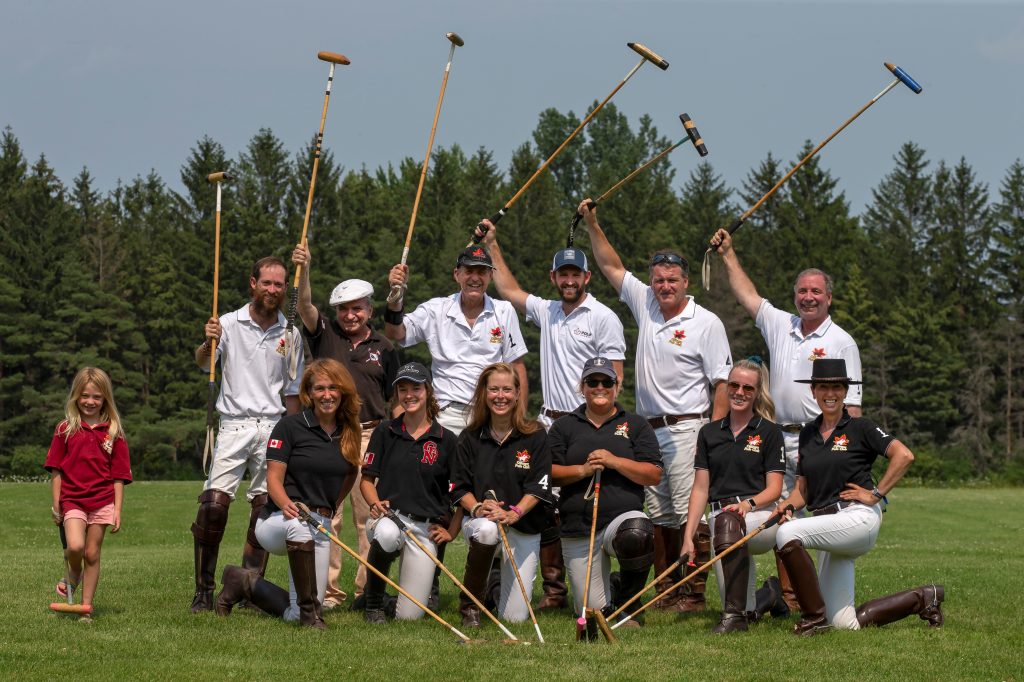
Ottawa Polo Club (OPC) members pose for a photo at their Manotick Field. Back row, left to right, are Barry Cloete, Edmond du Rogoff, Jean François Bonin, Robert Raby, Robert Campbell and Ward Yaternick. Front row, left to rights, are Sarah Gray, Emma Hill, Laura McEwen, Mel Gagnon, Alice Campbell and Carol MacLeod. Kasey Cloete (left) is part of the OPC family and her Daddy’s good luck charm! (Stephen J Thorne photo)
The club changed its name from the National Capital Polo Club to the Ottawa Polo Club in 1994 and the activities of the club declined for a few years. The players, however, still found venues to play.
In 2004, Ward and Denise Yaternick purchased part of the Kilreen farm property, including its first-rate polo field. The following year, the Huntingford Farm on Upper Dwyer Hill Road west of Richmond hosted polo. A number of international professionals also taught the sport and played there.
The Manotick Polo Club brought the sport back to its former field on Bankfield Road in 2008, where matches and tournaments have been played ever since.
In 2015, the Ottawa Polo Club was revived as a not-for-profit corporation. Members played at Thistlestone Farm in Beckwith and also at a polo field in Burritt’s Rapids. The Ottawa club and the Manotick club would merge in 2017, and the Ottawa Polo Club currently plays in Manotick and in Burritt’s Rapids. They host co-ed matches twice a week from May through August, on either Wednesday or Thursday evenings and again on Sundays. In September, the weekday games are dropped and matches are only played on Sunday until the end of the month. The public is welcome to take in regular club matches.
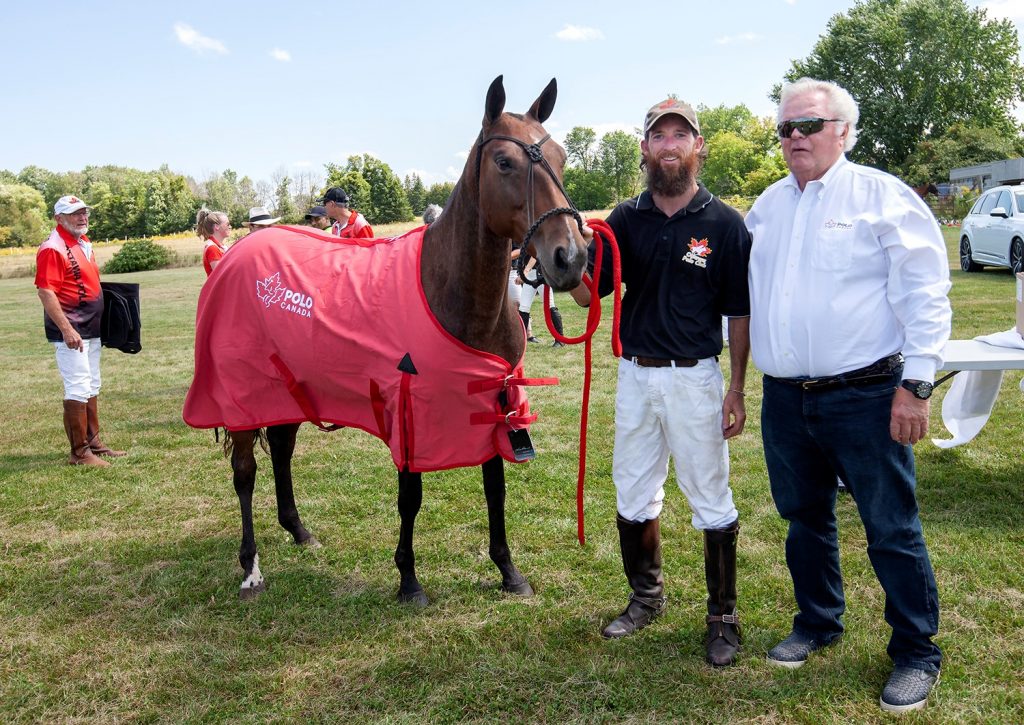
On Sat., Aug. 14, the Ottawa Polo Club hosted a Polo Canada Invitational Tournament at the Manotick Polo Field. Polo Canada President Don Pennycook (right) awarded Best Playing Pony to Ruby, owned and trained by Barry Cloete (left). (Stephen J Thorne photo)
The club’s mission is to provide a fun, competitive polo experience that inspires players of all abilities to safely progress on the continuum of polo skill development. An inclusive and friendly environment along with affordable membership fees showcase the club’s core values.
Who can play?
One of the most unique things about the Ottawa Polo Club is that the gender mix is almost 50-50. The largest growing demographic for the sport is young women. Alice Campbell represents that sector with the Ottawa Polo Club. She started playing polo with her father when she was 12 years old and has almost a decade of experience.
“I think that 50 per cent of Ottawa Polo Club members are women because we are a welcoming club that improves new players of all different skill levels to increase their level of play, helping more women feel more comfortable to join the club of a male dominated sport,” she said. “Polo has helped me develop and grow in many ways but the most important is discipline. In order to be safe during the matches you need to practice every day for the comfort of both horse and rider. The most important mindset needed to learn and play polo is patience. This sport is very difficult mentally and physically. You need to be patient with yourself and the horse.”
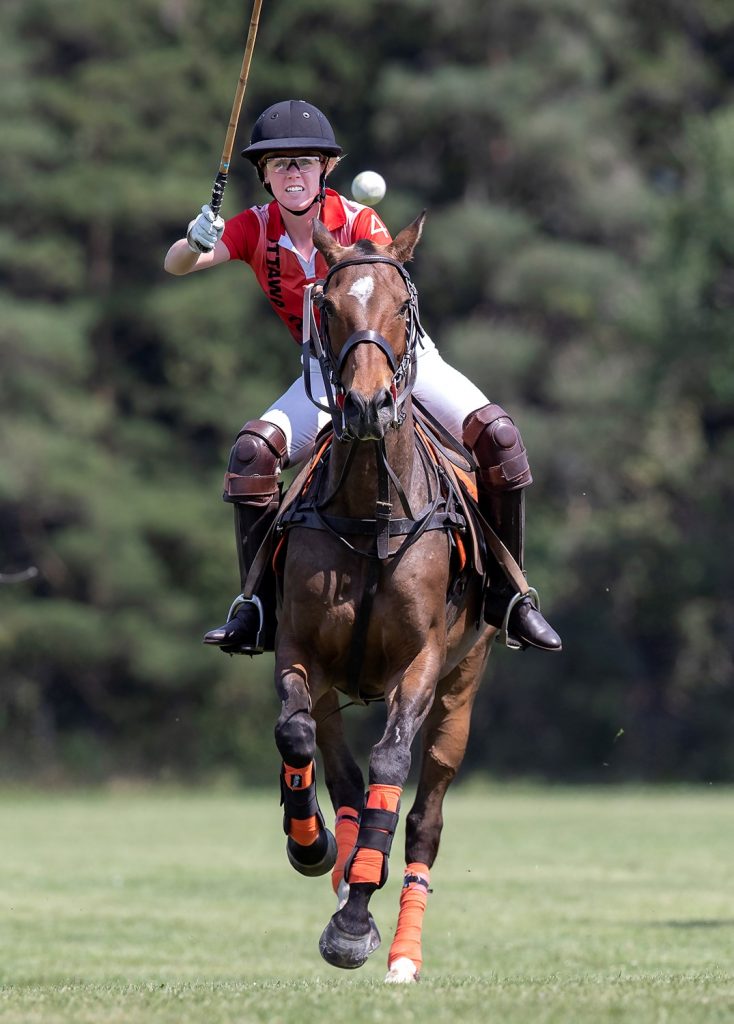
While polo is a sport that is much more accessible than most would expect, there are certain requirements. Players must have some experience riding. The horses used in polo also require specific training for the sport.
Barry Cloete, one of the Ottawa Polo Club’s directors, trains horses for polo at his farm in North Grenville.
“Training a horse for polo and playing polo require different skills,” Cloete said. “Many polo players buy made horses (i.e., trained polo ponies). My training experience at my Barefoot Acres Farms facility in North Grenville has been gratifying. Results take time and don’t happen overnight. I like to pick up horses early and do groundwork when they are young. For example, my seven-year-old mare Ruby—who won Best Playing Pony at the Polo Canada Invitational Tournament hosted by the Ottawa Polo Club on August 14, 2021—was four when I started her polo training. The traits of a good polo pony are equally important as the bloodlines and the breed. Polo ponies are brave and quiet with a good brain. Ruby goes from playing like a rocket on the field to being led around by a little kid!”
Thomas Francis is a 27-year-old management consultant who has always been drawn to the sport of polo. When he discovered that Ottawa Polo Club Director Robert Campbell was offering a 60-Day Polo Challenge training, he seized the opportunity. In July, Francis started training at Campbell’s polo facility in Burritt’s Rapids twice a week at 7 a.m.
“There is no better feeling than riding and finally swinging the mallet and hitting the ball; when you finally put everything you learn together and actually apply it,” he said. “I recommend that anyone interested first have some horse-riding experience. If you don’t, then the best thing you can do is have confidence. You need to be willing to put in the hours and get lots of practice.
“And even though in some places like Ottawa the sport is much more accessible, it still won’t come cheap, and even more so if you decide to pursue it and continue with it. It’s not basketball where you can just buy a ball and you’re good to go. You don’t need to buy a horse right from the beginning but knowing that there is some investment into equipment or training helps you really consider whether you want to give it a try and learn or not. The most important thing is to just have fun and enjoy it.”
For more information on the Ottawa Polo Club, visit www.ottawapoloclub.com or their Facebook page at www.facebook.com/OttawaPoloClub/.

